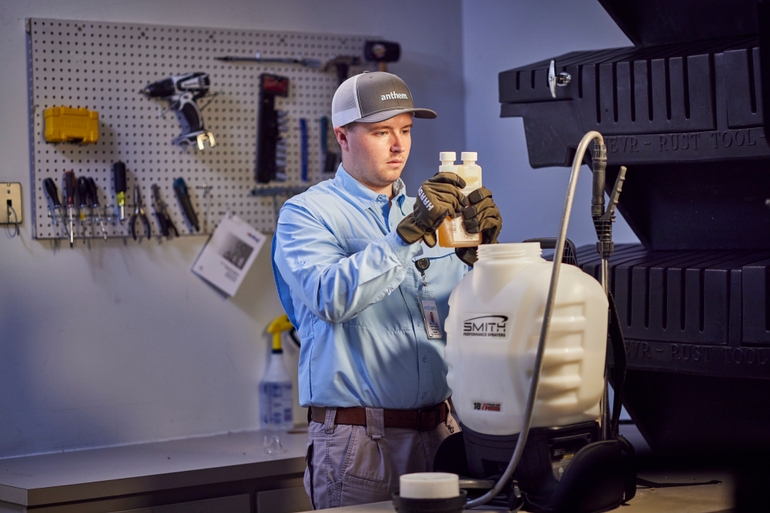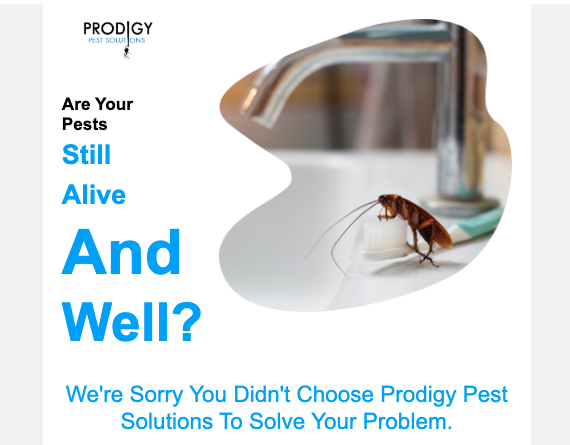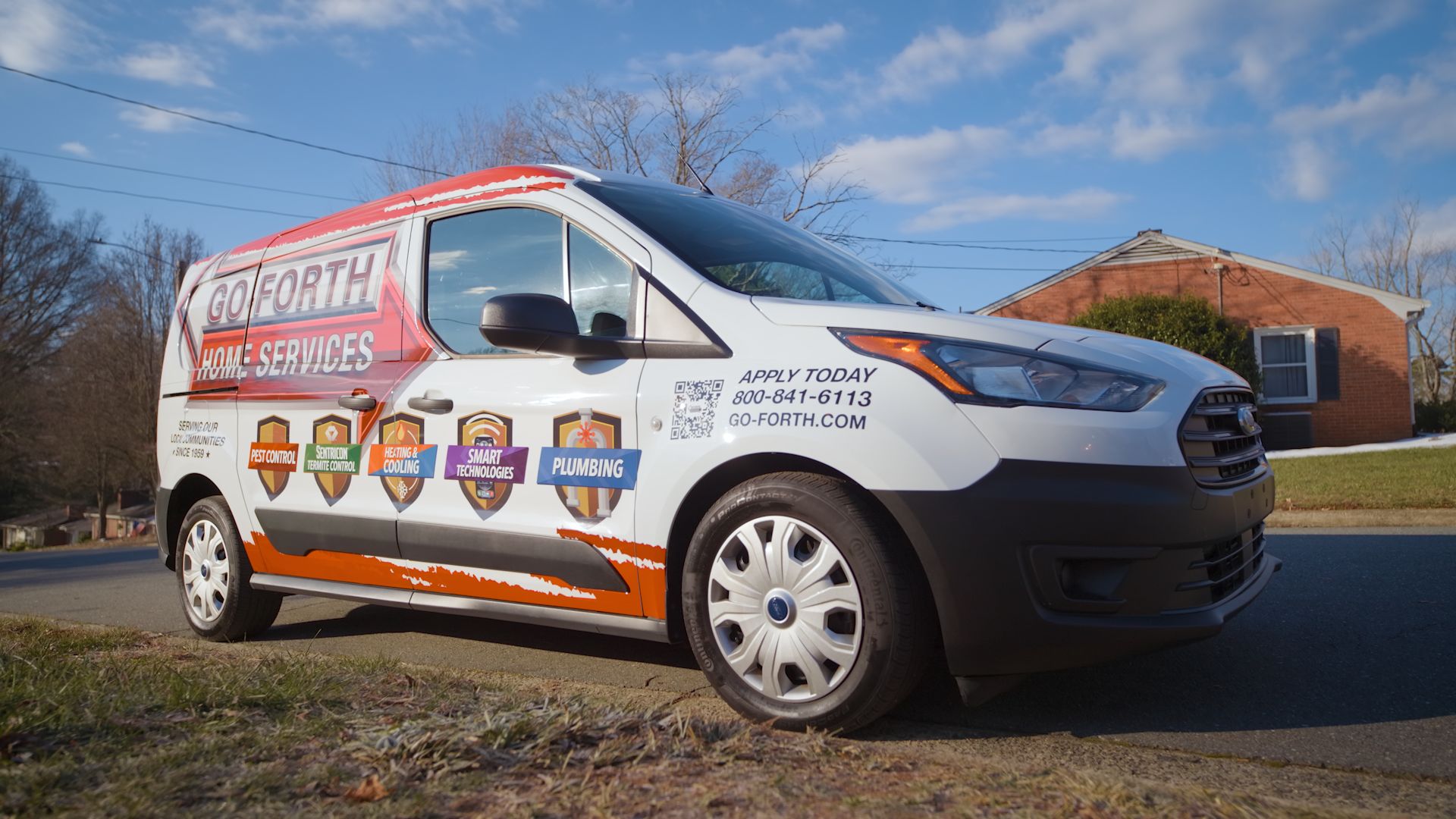Georgia Pest Control License & Certification (Updated in 2024)

Becoming a pest control professional provides a lucrative career path with a low barrier to entry. According to the U.S. Bureau of Labor Statistics, a pest control provider in 2023 earned $20.90 per hour on average, with a high school diploma or its equivalent as the typical entry-level education requirement.
However, a pest control technician must be licensed to perform services legally. Depending on the state, this process involves applications, exams, and fees.
Read on to learn the requirements for pest control licensure in Georgia.
What Is a Pest Control License?
A pest control license grants an individual or business the legal authorization to perform pest management services. State or local regulatory agencies issue pest control licenses to ensure pest control operators meet specific knowledge and practice standards.
Holding a pest control license demonstrates the provider has undergone the required training, understands the safe and effective use of pesticides, and complies with state and federal regulations.
The required license types differ depending on the services offered and service location.
Do You Need a Pest Control License in Georgia?
Yes, you need a license to perform pest control services in Georgia. The Georgia Department of Agriculture Structural Pest Office grants licenses for certified operators and companies, as outlined in the Georgia Structural Pest Control Act. In addition, any operator using pesticides requires a license from the Department of Agriculture’s Pesticide Program.
What Are the Different Types of Pest Control Licenses in Georgia?
The three classes of structural pest control credentials in Georgia include:
Company License: Required for any individual or company providing pest control services.
Certified Operator: Required for pest control operators for each category of service they perform.
Registered Employee: Required for all employees of licensed pest control companies who engage in the performance or solicitation of structural pest control services or work in the presence of a certified operator or registered employee.
Note that each of these licensing levels is required. For example, a firm with a company license still needs a certified operator. A certified operator needs a company license if they work for themselves or needs to be employed by a licensed company.
Structural pest control licenses are divided into four operational categories. Depending on the type of work performed, a person or company may be certified in one or multiple categories.
License Category | Description |
Category 28: Fumigation (FUM) | Fumigation application to structures or enclosed spaces to control insects, rodents, or other pests |
Category 29: Household Pest Control (HPC) | Use of pesticide, device, or practice to control pests that commonly enter structures, such as cockroaches, fleas, silverfish, ants, birds, rodents, wasps, etc. |
Category 30: Wood-destroying Organism Control (WDO) | Application of any measure to control termites, powder-post beetles, wood-boring beetles, or wood-destroying fungi in structures and/or adjacent outside areas |
Honey Bee Control and Removal (HBR) | Professional control and removal of an established honey bee colony in a structure |
Pesticide applicator licenses are also required for any operator applying pesticides and come in a number of categories:
License Category | Description |
24 Ornamental and Turf Pest Control | Commercial applicators using or supervising the use of restricted-use pesticides to control pests in ornamental trees, shrubs, flowers, and turf |
27 Right-of-Way Pest Control | Commercial applicators using or supervising the use of restricted-use pesticides in the maintenance of public infrastructure and utilities |
35 Industrial, Institutional, Structural, and Health-Related Pest Control | Commercial applicators using or supervising the use of restricted-use pesticides in or around food-handling establishments, residences, schools, hospitals, and industrial buildings |
36 Wood Treatment | Commercial applicators engaged in pressure treating lumber and timber with preservatives classified as restricted-use pesticides |
40 Worker Protection Standard | Training workers and handlers as required by EPA's Worker Protection Standard |
41 Commercial Mosquito Control | Employees using or supervising the use of pesticides to control mosquitoes on public and private grounds |
Additional pesticide license categories apply for pesticide use on agricultural plants, agricultural commodities, seed treatment, and other commercial pesticide applications. View the full list of pesticide license categories for further information.
What Are the Licensing Requirements for Pest Control Contractors in Georgia?
The Certified Operator license requires an applicant to:
Have at least two years of structural pest control work experience in the last five years, or hold a degree in entomology, public health, or a related subject and one year of structural pest control service experience within the last five years
Pass the core (general competency) examination plus an examination for each desired qualified category
For the Registered Employee Credential, an applicant must complete:
Ten hours of classroom training from a Certified Operator or Structural Pest Control Commission (SPCC)-approved instructor over the topics outlined in the Rules of the Georgia Structural Pest Control Commission section 620-3-.02(1)(e)(1)
70 hours of on-the-job training under the supervision of a Certified Operator or a registered employee in the categories in which registration is sought
A Commercial Pesticide Applicator License requires passing a general standards exam and a specific category exam with a score of 70% or higher.
What Are the Steps to Get a Pest Control License in Georgia?
The process to get a pest control license in Georgia varies based on the license type and category.
Structural Licensing
To obtain a Structural Pest Control Company License:
Employ a Designated Certified Operator (DCO) for each operation category.
Complete the Company License application form.
Submit the required proof of insurance to insurance@agr.georgia.gov.
Include the $180 fee via check or money order.
Mail or hand deliver the application and fee to the Georgia Department of Agriculture Structural Pest Division at 19 Martin Luther King Jr. Drive SW, Room 411, Atlanta, GA 30334.
To obtain a Structural Pest Control Certified Operator License:
Have at least two years of structural pest control work experience in the last five years, or hold a degree in entomology, public health, or a related subject and one year of structural pest control service experience within the last five years.
Apply for the Certified Operator exam and pay $45 per exam category.
Pass the Certified Operator exam for the categories in which you require licensing with at least a score of 70%. (All Operators must select the General category.)
Once notified of a passing grade, pay a $100 credential fee and submit the required documentation (will be outlined in passing notification).
To obtain the Registered Employee Credential:
The licensee (pest control company) is responsible for registering all non-certified employees within 30 days of employment.
Employees must be 18 or older and have 10 hours of classroom training and 70 hours of on-the-job training.
Apply for the registration exam, which incurs a $45 fee.
After passing, the licensee must submit the employee registration application along with a $10 registration fee to the Georgia Department of Agriculture or online.
Georgia Department of Agriculture (GDA) will issue a credential once all requirements are met.
Pesticide Applicator Licensing
To apply for a Pesticide Contractor License:
Take and pass the Commercial Applicator exam, which requires a $45 exam fee.
Complete the application online.
Submit Secure and Verifiable documents when prompted.
Once approved, you’ll receive an email with directions to pay the $55 license fee.
The license certificate will be mailed within one to seven business days.
What Are the Benefits of Getting a Pest Control License in Georgia?
There are many benefits to obtaining a pest control license in Georgia:
First and most importantly, it is required by law to be licensed to perform pest control services in the state.
It will make you a more attractive candidate to prospective employers.
A trade license is proof of your experience and skill.
Only licensed pest control contractors can operate a business and advertise services, obtain commercial insurance, and bid on public and government projects.
Having a license protects your company and customers.
It also increases your earning potential.
What Is the Mean Salary for a Pest Control Technician in Georgia?
The U.S. Bureau of Labor Statistics lists the annual mean pay for pest control workers nationally as $43,470 and $43,770 for those in Georgia. As you might expect, that salary increases as you acquire more experience.
According to Indeed, the average wage for a pest control technician in Georgia is $17.41 per hour or $43,312 for a full-time pest control technician per year.
Pay ranges can vary widely, depending on the city and many other important factors, including education, certifications, additional skills, and the number of years you have spent in your profession.
What Business Owners Need to Know
Getting the most out of a pest control worker, no matter where they are in their licensing journey, takes work. FieldRoutes cloud-based, all-in-one pest control software gives technicians and business owners the technology they need to operate efficiently, as well as the data they need to do it smartly.
The platform’s features include:
Drag-and-drop scheduling based on technician proximity, skills, or other filters
Optimized routing that prioritizes technician and fuel efficiency
Pest control reporting software that empowers business owners to make decisions that improve profitability
Robust integrations to deliver multiple data sources into a single platform
Integrated Sentricon system to ensure NPMA-33 compliance when tracking wood-destroying organisms
CRM to visualize the customer lifecycle and convert more leads
To learn more, schedule a free demo with a product expert.
How Much Does It Cost To Get A Pest Control License in Georgia?
Costs depend on the type of licensing:
Structural Pest Control Company License: $180
Structural Pest Control Certified Operator: $45 per exam category and a $100 credential fee
Structural Pest Control Registered Employee Credential: $45 exam fee and $10 registration fee
Pesticide Applicator License: $45 exam fee and $55 license fee
There is also the expense of securing the various types of insurance required for licensure, but that is primarily done by the contracting company, so this will only affect you if you decide to open your own business.
How Long Does It Take To Get A Pest Control License in Georgia?
The length of time it takes to obtain a pest control license depends on the license type. The Certified Operator license requires two years of work experience or a related degree and one year of experience over the last five years.
The Registered Employee Credential requires 10 hours of classroom training and 70 hours of on-the-job training.
Pesticide Applicator licenses are issued within a week of passing the required exam.
Georgia Pest Control Training Programs And Schools
If you choose to start your career path at a college or university, you can pursue a degree in entomology, public health, or a related subject. This not only better prepares you for a pest control career, but can count toward a year of experience for a Certified Operator license.
There are many higher education options throughout The Peach State that offer these types of programs.
Here are some options:
Athens Technical College | Athens | Pest Control Exam Prep Course — 2 hours
University of Georgia | Athens | BSES Entomology — 4 years
In addition, continuing education courses are offered by colleges, pest control organizations, and businesses. All courses and instructors must be approved through the Georgia Structural Pest Control Commission.
Georgia Licensing Exam Details
Structural Pest Control Certified Operators must pass the Certified Operator exam with a score of 70% or higher. The exam has different categories based on the services the test taker wants to provide. To study for the exam, applicants should review the Rules of the Georgia Structural Pest Control Commission and Truman’s Scientific Guide to Pest Management Operations.
Registered Employees must pass a registration exam. The computer-based registration exam is available at technical college testing centers across the state for a $45 fee.
Pesticide contractors are required to take the Commercial Applicator exam, which requires a $45 exam fee.
Who Issues Pest Control Licenses in Georgia?
The Georgia Department of Agriculture Structural Pest Office grants licenses for structural pest control, while the Department of Agriculture’s Pesticide Program issues pesticide applicator licenses.
Does My Georgia Pest Control License Work in Any Other State?
The Georgia Department of Agriculture Pesticide Program reciprocates commercial pesticide licenses with any state with an EPA-approved pesticide program, as long as the license category concurs with the State of Georgia. In addition, Georgia has reciprocal agreements with Alabama, Florida, Louisiana, Mississippi, North Carolina, South Carolina, and Tennessee.
However, the Georgia Structural Pest Control Commission does not have reciprocal certification agreements with other states.
Pesticide Applicator Specific Requirements: EPA Certification
Federal law requires any person who applies or supervises the use of restricted-use pesticides (RUPs) to be certified in accordance with EPA regulations. This certification is completed by each state through their Pesticide Safety Education Programs. All states meet the minimum EPA requirements, and some also apply stricter regulations.
The federal regulations require commercial applicators to show practical knowledge of core pesticide use and safety, as well as one specific category. Core safety includes knowledge of:
Pesticide labels
Pesticide hazards
First aid, personal protective equipment, and emergency response
Pesticides in the environment
Pest identification and management
Pesticide formulations
Laws and regulations
Application equipment and techniques
Do I Need to Renew my Georgia Pest Control License?
Structural pest control licenses and registrations must be renewed every two years. These licenses expire on June 30 of each odd-numbered year. The following renewal fees apply:
Company License: $100, plus a $70 research fee
Operator Certification: $100
Employee Registration: $10
A Commercial Pesticide Applicator License must be renewed every five years.
Continuing Education
Employee Registration renewal requires either retaking the exam or earning the following continuing education credits, based on category:
Re-registration in Fumigation: 3 credit hours
Re-registration in Household Pest Control: 8 credits
Re-registration in Wood-destroying Organism Control: 8 credits
Certified Operator renewal requires either retaking the exam or earning the following re-certification credits, based on the category:
Recertification in Fumigation: 12 credits
Recertification in Household Pest Control: 25 credits
Recertification in Wood-destroying Organism Control: 25 credits
For pesticide use, commercial applicator license renewal requires passing the exam again or taking 6-10 hours of recertification courses for each license category.
Resources
You can stay up to date on the pest control industry in several ways, such as:
Reading pest control blogs
Joining industry associations, such as the National Pest Management Association
Ready to Get Certified?
Getting a pest control license in Georgia involves clear steps and requirements, ensuring high standards and safe practices. Whether you're starting out or looking to advance, understanding the different license types and necessary training is key to success.
To learn more about the pest control industry, including best practices, check out the FieldRoutes blog.





